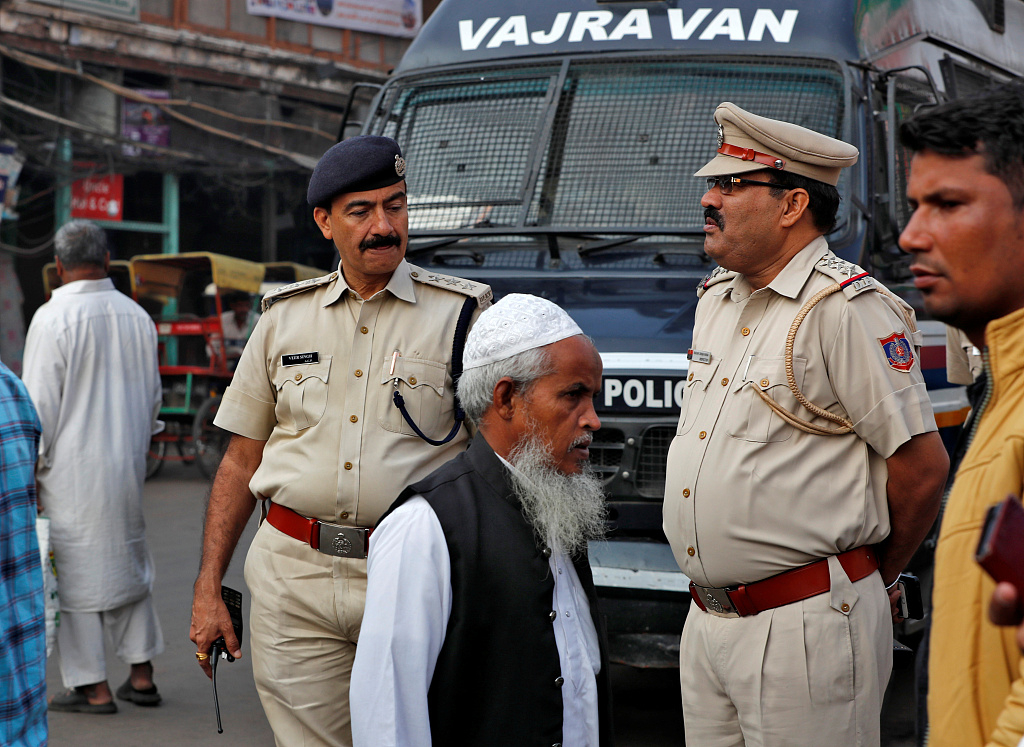
Police officers stand guard in a street outside Jama Masjid, before Supreme Court's verdict on a disputed religious site claimed by both majority Hindus and Muslim in Ayodhya, Delhi, India, November 9, 2019. /VCG Photo
Police officers stand guard in a street outside Jama Masjid, before Supreme Court's verdict on a disputed religious site claimed by both majority Hindus and Muslim in Ayodhya, Delhi, India, November 9, 2019. /VCG Photo
India's Supreme Court on Saturday awarded a bitterly contested religious site to Hindus, dealing a defeat to Muslims who also claim the land. The contentious case was immediately deplored by a key Muslim body.
The ruling in the dispute between Hindu and Muslim groups paves the way for the construction of a Hindu temple on the site in the northern town of Ayodhya, a proposal long supported by Prime Minister Narendra Modi's ruling Hindu-nationalist party.
Saturday's judgment, which is likely to be viewed as a win for Modi's Bharatiya Janata Party (BJP) and its backers, was criticized as unfair by a lawyer for the Muslim group involved in the case. However, the group's leader said ultimately it would accept the verdict and called for peace between India's majority Hindus and Muslims, who constitute 14 percent of its 1.3 billion people.
Both sides appealed for calm. The Hindu group Rashtriya Swayamsevak Sangh, the parent organization of Modi's party, had already decided against any celebrations to avoid provoking sectarian violence.
"Today's Supreme Court decision has given the nation the message that even the most difficult of all problems falls within the ambit of the constitution and within the boundaries of the judicial system," Modi said in a televised address on Saturday evening, calling for "a new India" free of hatred.
He had earlier tweeted that the verdict should not be seen as "a win or loss for anybody."
Neelanjan Sircar, an assistant professor at Ashoka University near New Delhi, said the verdict would benefit the BJP, which won reelection in May, but a slowing economy would ultimately take center stage for voters.
"These things don't work forever ... Ram Temple isn't going to put food on the table," Sircar said.
The town looked deserted on Saturday, with authorities turning back thousands of Hindu pilgrims who were congregating for a religious event scheduled for Tuesday.
Thousands of paramilitary force members and police were deployed in Ayodhya and other sensitive areas across India. Police have arrested about 500 people for posting provocative messages on social media in Uttar Pradesh. And they also have detained around 5,000 people with criminal backgrounds across the state to prevent them from creating trouble after the court verdict, according to Uttar Pradesh government spokesman Awanish Awasthi. There were no immediate reports of unrest.
Hindus believe the site is the birthplace of Lord Ram, a physical incarnation of the Hindu god Vishnu, and say the site was holy for Hindus long before the Muslim Mughals, India's most prominent Islamic rulers, built the Babri mosque there in 1528.
In 1992, a Hindu mob destroyed the 16th-century Babri Mosque on the site, triggering riots in which about 2,000 people, most of them Muslims, were killed across the country. Court battles over the ownership of the site followed.
(With input from AP and Reuters)